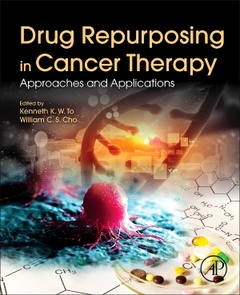Drug Repurposing in Cancer Therapy Approaches and Applications

Drug Repurposing in Cancer Therapy: Approaches and Applications provides comprehensive and updated information from experts in basic science research and clinical practice on how existing drugs can be repurposed for cancer treatment. The book summarizes successful stories that may assist researchers in the field to better design their studies for new repurposing projects. Sections discuss specific topics such as in silico prediction and high throughput screening of repurposed drugs, drug repurposing for overcoming chemoresistance and eradicating cancer stem cells, and clinical investigation on combination of repurposed drug and anticancer therapy.
Cancer researchers, oncologists, pharmacologists and several members of biomedical field who are interested in learning more about the use of existing drugs for different purposes in cancer therapy will find this to be a valuable resource.
William C.S. Cho, PhD, RCMP, FHKIMLS, FHKSMDS, Chartered Scientist (UK), FIBMS (UK). Department of Clinical Oncology, Queen Elizabeth Hospital, Hong Kong SAR, China. Dr. Cho’s primary research interests focus on cancer research to discover biomarkers for cancer diagnosis, treatment prediction, and prognosis. As a seasoned researcher, Dr. Cho has conducted cancer research using molecular biology, proteomics, genomics, immunology, bioinformatics, and next-generation sequencing technologies. Dr. Cho has published more than 600 peer-reviewed papers (Lancet, Lancet Oncology, Annals of Oncology, Lancet Gastroenterology & Hepatology, Advanced Science, Nature Communications, PNAS, Molecular Cancer, Journal of Thoracic Oncology, Journal of the National Cancer Institute, Journal of Extracellular Vesicles, Clinical Cancer Research, Clinical Chemistry, Theranostics, etc.) covering cancer biomarkers, proteomics, noncoding RNA, traditional Chinese medicine, and dozens of books (including An Omics Perspective on Cancer Research, MicroRNAs in Cancer Translational Research, Drug Repurposing in Cancer Therapy: Approaches
- Presents a systematic and up-to-date collection of the research underpinning the various drug repurposing approaches for a quick, but in-depth understanding on current trends in drug repurposing research
- Brings better understanding of the drug repurposing process in a holistic way, combining both basic and clinical sciences
- Encompasses a collection of successful stories of drug repurposing for cancer therapy in different cancer types
Date de parution : 07-2020
Ouvrage de 458 p.
19x23.3 cm
Mots-clés :
Aldehyde dehydrogenase; Anticancer agents; Anticancer therapy; Artificial intelligence; ATP-binding cassette transporters; Aurora kinases; Beta-blockers; Big data; Biotransformation; Blinded serendipity–based repositioning; Breast cancer stem cells; Breast cancer subtypes; Breast cancer treatment strategies; Cancer drug development; Cancer; Celecoxib; Cell cycle; Chemosensitizer; Chemotherapy; Clinical studies; Computational drug discovery; Computational screening–based repositioning; Copper gluconate; Deoxyribonucleic acid; Disease network–based repositioning; Disulfiram; DNA repair; Doxorubicin; Drug repositioning; Drug repurposing; Drug rescue; Drug resistance; Drug–drug interaction; Drug; Economic incentives; Electronic health record; Epithelial–mesenchymal transition; Genetically engineered mouse models; Hard repurposing; Health economics; Hepatocellular carcinoma; High-throughput screening–based repositioning; HR; Human immunodeficiency virus; Immune checkpoint inhibitors; Immunotherapy; In silico; Ligand-based drug discovery; Lung; Machine learning; Microbiome; Molecular docking; Multidrug resistance; Nanomedicine; Nanotechnology; NK1R; Non-small cell lung cancer; Off-target effects; Omics data; Oncogenic signalling; Pancreatic cancer; Pancreatic ductal adenocarcinoma; Pathway analysis; Personalized medicine; Polypharmacology; Shape similarity–based screening; Side effect data; Small cell lung cancer; Soft repurposing; Squamous cell lung cancer; Synergistic drug combination; Systems biology; Systems pharmacology; Targeted therapy; Text mining; TNBC; Ubiquitin proteasome system; Vesicles sequestration; Virtual screening; Vitamin D; WNT; Xenograft models



